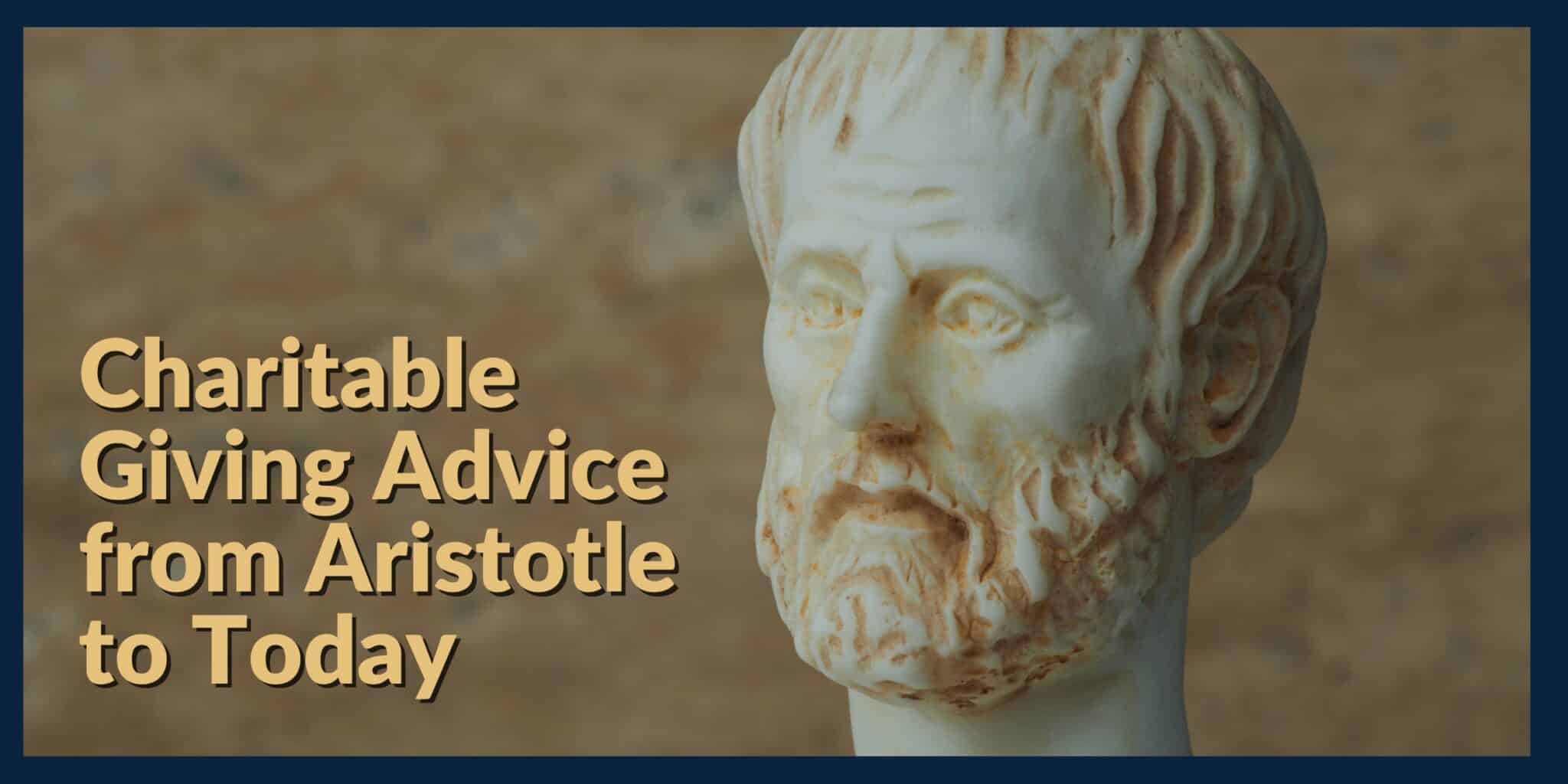
This article was originally published in full on Tacoma’s The News Tribune. Gary Brooks has been a contributing author for the paper since 2008 and is also a Partner and Senior Wealth Advisor at Mission Wealth in Gig Harbor, WA.
Like many people do this time of year, 2,370 years ago – between teaching breakthrough ideas on logic and ethics, biology, and economics – Aristotle pondered charitable giving. Also, like people today, Aristotle was confounded by how a simple idea could quickly become complex.
In 347 BC, the Greek polymath and philosopher said: “To give away money is an easy matter and in any man’s power. But to decide to whom to give it, and how large, and when, and for what purpose and how, is neither in every man’s power nor an easy matter.”
More than two millennia later, the United States is the most charitable country in the world, donating nearly 2 percent of the national gross domestic product (GDP, or economic output). That equates to more than a billion dollars a day of giving, and only a small minority of it is done by corporations. Most philanthropy is performed by individuals trying to make the same decisions as Aristotle.
The conundrum of who to give to, how much, and when remains a largely personal decision, one that has a role at the core of a comprehensive financial plan. Those decisions might eternally remain challenging. As for how to give, there are options to choose from, and, among them, the easiest might not be the most financially beneficial to the donor.
Ways to Give – In Order of Complexity
In order of progression from simple to more complex (but possibly with more tax benefits or retirement income options), here are ideas for how to structure your donations:
▪ Cash/Check/Credit Card – Any sized nonprofit organization can receive cash, and it doesn’t require any special paperwork to transfer the money to the charity. If the donation will help you rise above the standard deduction on your tax return, make sure to gather acknowledgment of your gift from the nonprofit.
▪ Appreciated Asset – Not all giving is led by tax considerations, but when you do start to think about the most tax-efficient ways to give, moving beyond your bank account yields benefits. If you have assets outside of pre-tax retirement accounts and those assets have unrealized capital gains, you can donate the asset (stocks, mutual funds, property, shares of business ownership, etc.). Neither you nor the nonprofit organization will pay any tax on the associated capital gains. You will have to orchestrate a transfer of ownership that will require some paperwork. You might be able to claim itemized deductions on your tax return using appreciated assets up to 30 percent of your adjusted gross income.
▪ Qualified Charitable Distribution (QCD) – For people who are older than age 70½ at the time of the donation, making qualified charitable distributions (QCD), or gifts directly from your IRA allows you to donate pre-tax dollars. This reduces your taxable income, which might also reduce your Medicare premiums. If you aren’t likely to itemize deductions on your tax return, the QCD is optimal for giving. Unfortunately, 401(k) and other employer retirement accounts aren’t eligible for QCDs. You would have to complete a rollover to an IRA first. The QCD limit is $100,000 per year per person, spread out in whatever increments you want. If you complete QCDs, identify them on your tax return. They are not clearly noted on Form-1099R which identifies withdrawals from retirement accounts each year.
▪ Donor-Advised Fund (DAF) – While it requires the creation of a new account with an investment custodian, community foundation, or other charitable entity, the donor-advised fund (DAF) is a popular strategy. Specifically for people who want to make a significant contribution in a single tax year but then take their time making grants from the account to nonprofits, perhaps over many years. You could use appreciated assets as the funding source for your DAF but cannot fund it with IRA QCDs. Donor-advised funds are also a widespread estate planning tool.
▪ Charitable Gift Annuity – If, in addition to your charitable intent, you prefer a significant current tax deduction and ongoing income for life, charitable gift annuities might fit your requirements. You can fund the CGA with appreciated assets. Most colleges and many large nonprofits offer CGAs, but they are less common with smaller charities. There are abundant gift annuity calculators available online that can model how much tax deduction and what level of ongoing income apply to your gift.
▪ Remainder Trusts – Less common, partly due to their need for legal work to create a trust, charitable remainder trusts offer significant tax benefits as well as retained access to the donated investment or income from it.
Insights from Our Recent Charitable Giving Webinar
At Mission Wealth, we are committed to helping you navigate the complexities of financial planning and empowering you to make a positive impact on the world. We recently held a webinar where the Director of Philanthropic Strategy, Amanda Thomas, and the Director of Estate Strategy, Andrew Kulha, shared valuable insights that will shape your financial and philanthropic journey.
The goal of the strategy webinar is to help our clients understand how to approach family legacy planning for their estate planning and actionable ideas for how to incorporate philanthropy into legacy planning. Read or watch the recap here.
Maximize Your Impact. Inspire Future Generations.
Talk with a financial planner about your next steps.Charitable Guidance For Your Full Financial Journey
We help our clients create their charitable Mission Statement, develop their areas of focus, and utilize our Wealth Strategy Team to make recommendations on tax and estate-efficient portfolios. We also introduce clients to potential nonprofit partners in their field of interest and help implement their strategies to achieve their mission.
Mission Wealth’s vision is to provide caring advice that empowers families to achieve their true wealth. We are fiduciaries, and our holistic planning process provides clarity and confidence. For more information on Mission Wealth, please visit missionwealth.com.
To meet with a Mission Wealth financial advisor for a complimentary consultation, contact us today at (805) 882-2360.
Recent Charitable Planning & Philanthropy Articles

Washington Estate Taxes – Planning for State-Level Peculiarities
September 17, 2024
Giving Back: How One Partner is Making a Difference at HORSEPOWER Therapeutic Learning Center
July 26, 2024

